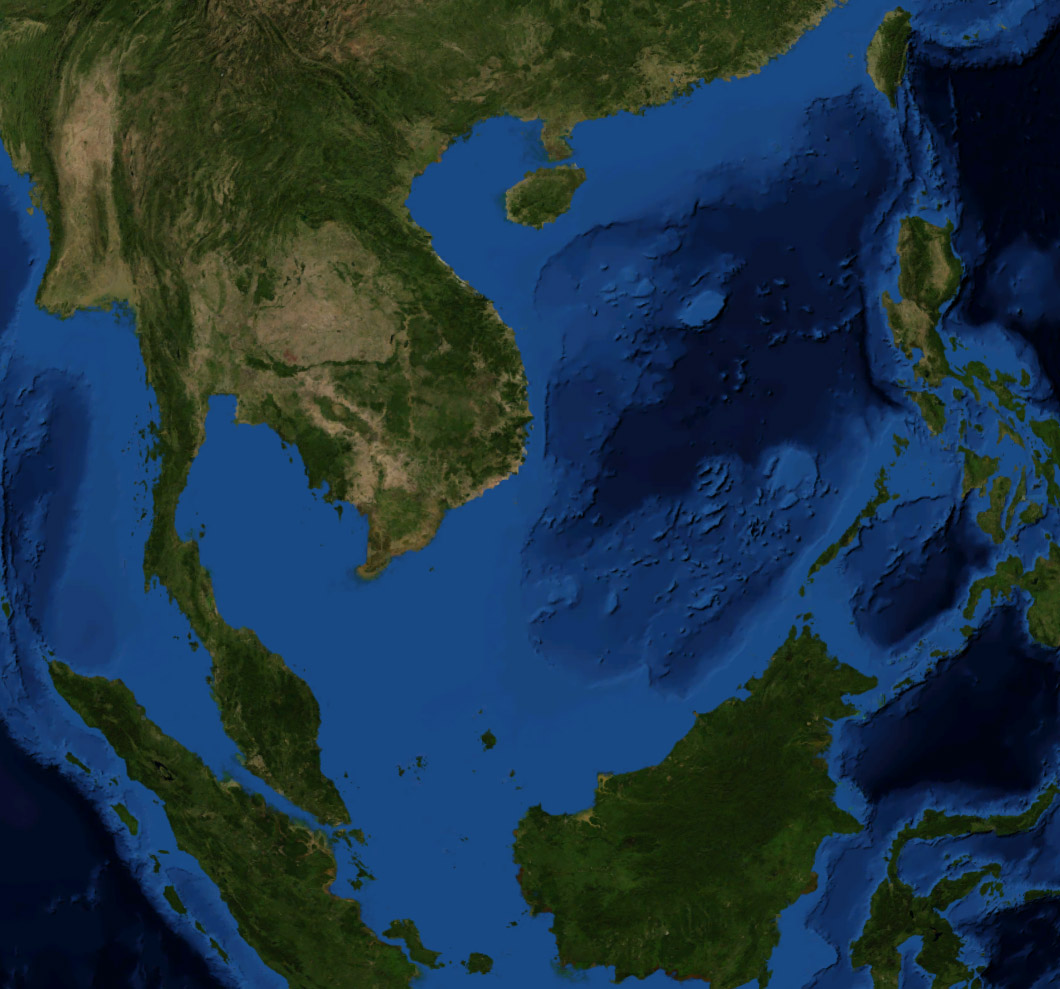News
Chinese military presence doesn’t mean SCS ownership: Palace

FILE: Satellite picture of West Philippine Sea/South China Sea (Photo By Serg!o – Satellite pictures, from NASA World Wind Globe, version 1.4, Public Domain)
MANILA – Chinese military presence in territories claimed by the Philippines will “never ripen” into a valid legal ownership, Malacañang said Thursday.
In a virtual Palace briefing, Presidential Spokesperson Harry Roque said the 2016 Hague-based Permanent Court of Arbitration (PCA) ruling has already invalidated China’s expansive claim in the South China Sea.
He said President Rodrigo Duterte, who invoked the arbitral ruling for the first time before the United Nations General Assembly (UNGA) last Wednesday, reasserted that the arbitral victory cannot be erased or ignored since it is already part of international law.
“Ang tinutukoy po diyan ng ating Presidente, kahit anong physical military occupation nila sa mga isla na ang sabi naman ng Tribunal ay kabahagi ng ating (The President is saying that whatever physical military occupation they have in the islands, which the Tribunal ruled is part of our) exclusive economic zone (EEZ), will never ripen into a valid legal title,” he said.
He, however, recognized the presence of Chinese Coast Guards near the EEZ as part of freedom of navigation.
“Alam ninyo po sa EEZ kasi, lahat po ng mga sasakyan ay may kalayaang maglayag. So iyong paglalayag po mismo sa EEZ ay hindi po pinagbabawal (You know the EEZ, all ships have freedom of navigation. So navigating in the EEZ is not illegal),” he said.
Asked if the Philippines is open to proposing a resolution before the UNGA calling on China to respect The Hague ruling, Roque said “anything is possible.”
“But there has not been any step to that effect ordered by the Palace yet,” he added.
Roque, meanwhile, welcomed praises from incumbent and former Cabinet officials on Duterte’s speech, but reminded them that it was also “a restatement of an old existing policy.”
“Kampanya pa lang po, sinabi ni Presidente, hindi niya isu-surrender ang maski isang inch ng ating teritoryo, so iyan po ay pagiging consistent lamang na wala po tayong ipamimigay na teritoryo at paninindigan po natin iyong ating panalo sa (Since his campaign, the President was already saying he would not surrender even an inch of our territory, so he was just being consistent that we won’t give up our territory and we will invoke our victory at the) UN Tribunal of the Law of the Sea,” he said.
Don’t dictate
After Duterte invoked the arbitral ruling, former Foreign Affairs Secretary Albert del Rosario, who praised the President’s move, said the next step is to rally support from more countries.
Roque, however, dismissed del Rosario’s suggestion, saying he was not entitled to dictate on the President on what to do.
“He (del Rosario) is a Filipino, he is entitled to speak pero parang hindi po maganda na dinidiktihan niya ang Presidente. Hindi ko po alam kung ano ang special qualification niya para diktahan niya ang isang Presidente (it’s not good to dictate on the President. I don’t know what special qualifications he has to dictate on the President),” he said.
He again blamed the former Foreign Affairs chief for losing control over the Panatag Shoal (Scarborough Shoal) during the previous administration.
Despite Duterte’s invocation of the arbitral ruling, Roque said he does not think the sea row would be resolved anytime soon.
“I don’t think the resolution of the territorial dispute is forthcoming in our lifetime. So hayaan muna po natin iyan, basta nandiyan po ang desisyon diyan, malinaw kung ano ang nakasaad sa (let’s leave it be, the decision is there, it’s clearly stated in) international law,” he said.
The sea row, he said, is not the sum total of bilateral relations between the Philippines and China.
“The President has been consistent – we will move on matters that we could move forward on including trade and investments; and we will, for the time being, set this aside,” he added.
In his debut speech at the UNGA, Duterte asserted the Philippines’ arbitral ruling which invalidated China’s expansive claim in the South China Sea.
Duterte said the arbitral ruling “is now part of international law, beyond compromise and beyond the reach of passing governments to dilute, diminish or abandon.”





















